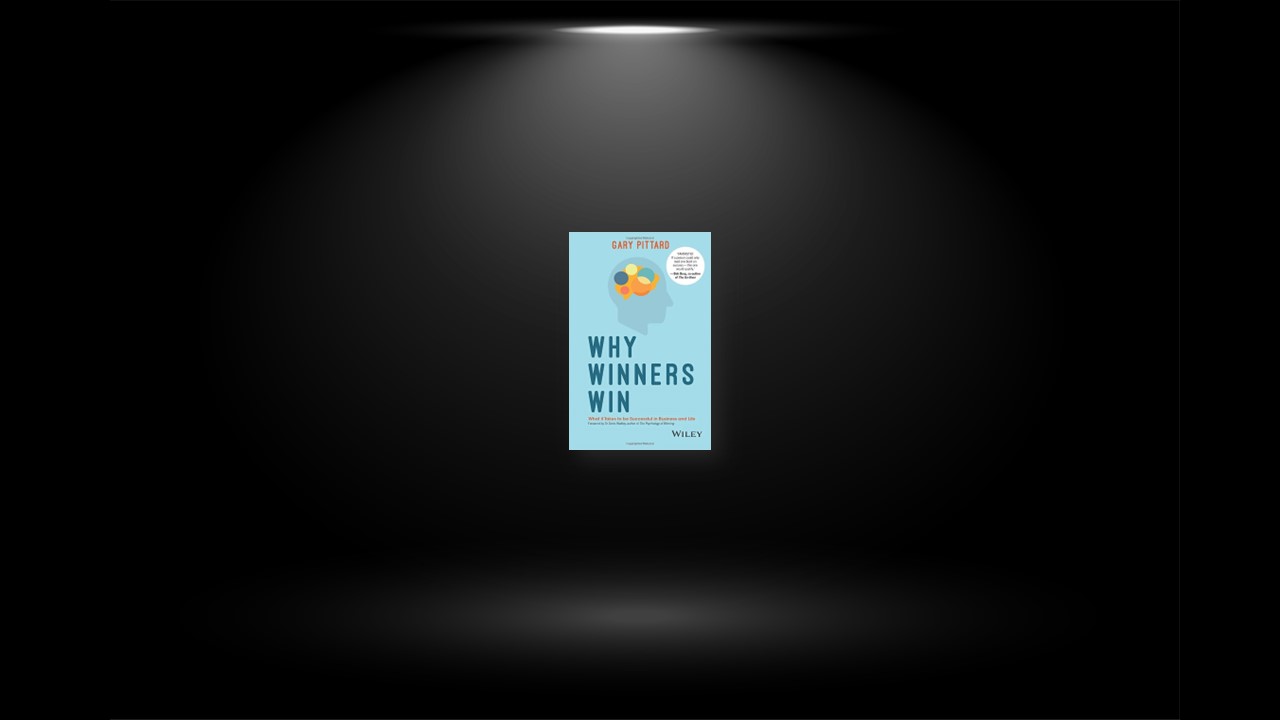The four-step path
Winners win because they follow the four-step path of the success journey:
- Attitude: It all starts with the right attitude! This alone isn’t enough, but it’s an essential first step, because it gives you the internal motivation to keep going.
- Knowledge: The next step is knowing where you want to go and how to get there. This means having a blueprint (a ‘big picture’) for your life, creating goals along the way, setting challenging but realistic targets, and making plans to achieve those targets.
- Skill: The next step is to acquire the necessary skills to put those plans into action. This book is about being successful in business and in life, so although this chapter focuses on sales skills, the lessons can be applied in all types of situations.
- Competent action: Finally, we look at how to put your skills into practice by taking action.
#1 Attitude
In Hundred Percenters, Mark Murphy writes: ‘We learned 46 percent of new hires fail within 18 months of starting the job. Unsettling to hear, but here’s the part that’s really critical: Out of the 46 percent of employees who fail to become any kind of acceptable performer, let alone Hundred Percenters, only 11 percent of the time a lack of technical ability, or skill, is to blame. For the other 89 percent, a lousy attitude is the clear reason behind employee failure.’
Dr Denis Waitley puts it best:
The Winner’s Edge is all in the attitude! Not aptitude — attitude is the criterion for success. But you can’t buy an attitude for a million dollars. Attitudes are not for sale.
Deserving
Allow yourself to accept the good things in life, and be grateful for them. Don’t think, ‘Why me?’ Why not you? Why shouldn’t you have the best your career can offer you?
When someone gives you a compliment, you don’t have to return the compliment with something like, ‘Well, thanks very much. You look really nice too.’ Just smile and say thank you. Be gracious in accepting the good things in life.
Self-esteem
Don’t worry about things you can’t change; focus on the things you can. You will be surprised to discover you have much more control than you think.
When you’re working towards a meaningful goal, you feel in control and feel better about yourself. Now add the element of quality to your life: Do quality work, cut down on junk purchases and impulse buying, and buy fewer, better quality things. These are some of life’s gifts. As you start to accept them, you start to feel good about yourself, and your self-esteem improves.
Love of quality
Close enough isn’t good enough — at least not to a winner. If you want success, choose quality.
This is an important lesson that applies equally to parents, students, business leaders, customer service people — and, of course, you in your professional role. Whatever you do, do it to the best of your ability.
Start by deciding what you want. You can’t have everything, so choose wisely. There’s an old saying: ‘Be careful what you wish for — you just might get it.’
#2 Knowledge
Know your destination
Think about the last time you planned a journey. What is the first choice you made? The destination, of course. You would never start with the itinerary — flights, hotels, transfers or tours. The destination is your first decision.
Planning a successful career is similar to planning a holiday: The destination comes first.
Decide what success means to you. This is your destination, and it’s an important decision. You don’t plan a trip to Europe without first deciding which countries you’re going to visit. Similarly, you can’t define success without clearly deciding what success looks like to you.
Set clear and precise goals
According to Mark Murphy in his book Hundred Percenters, goals also need to be HARD — that is, Heartfelt, Animated, Required and Difficult:
Heartfelt: They exist to serve something bigger than you.
Animated: They must be so vivid that not reaching them will leave you wanting; there will be something missing in your life if you don’t reach those goals. Most people set goals to shut their bosses up, but animated goals define your life’s direction.
Required: These are things that are as critical to your continued existence as breathing, water and food.
Difficult: They’re so hard they’ll test all of your limits.
Murphy sees HARD goals as both inspirational and aspirational. They force you to push through your self-imposed limitations to focus on something bigger than your own immediate wants, and to solve vital challenges.
Use affirmations
A commitment made must become a commitment honoured, as each one counts in more ways than you can possibly imagine. Your ability to honour your promises directly impacts your credibility, reputation, trustworthiness, earning ability, and overall peace of mind. Character defines an individual; honouring commitments helps to define character.
If you look at successful people in any field, you may discover they’re not necessarily the brightest, best looking, fastest, or strongest of the bunch. What you will find, however, is that they’re the ones with the deepest reservoir of commitment. They fully understand all great accomplishment is preceded by great commitment. So, how great is the power of your commitment?
Affirmations are commitments to your goals. Develop the habit of honouring commitments, whether to others or to yourself.
Write the affirmation and sign it, 15 times a day for 21 unbroken days. You will start to think, walk, talk, act, train and present like a $600 000 producer; and when you think, walk, talk, act, train and present like a $600 000 producer, you will become one. This is why affirmations are critically important.
Know your strategy
Salespeople fall into two main categories, according to their attitude and approach. Mark Murphy calls them A and B Players.
B Players are just order takers. They don’t have a strategy. They reinvent the sales process for every buyer, and never learn from their mistakes or successes. For example, even when they receive the same objection repeatedly, they won’t question their approach; they simply repeat it.
A Players, on the other hand, approach a sale with a proven strategy: the steps they take, the questions they ask, the things they ask for and the order in which they follow the process. Buyers change, and A Players are flexible enough to adapt, but their strategy stays the same. It works consistently because A Players know exactly what they’re going to do, when and why.
Understand clients
Order takers don’t persuade someone to buy. If asked, they may answer questions and describe various options, but they don’t proactively create the sale. The prospect, typically induced by advertising or other means, decides on their own to make the purchase. The order taker exercises very little control.
Professional salespeople aren’t order takers. They fully understand the needs and concerns of their clients, so they know the right questions to ask. By asking the right questions, they develop a deeper understanding of the problems their clients face. They then target their presentations toward showing clients that they, the salesperson, can solve those problems.
Here’s a major factor in your success: Find out what people want and help them get it.
The first part (finding out what people want) is lost on order takers. They never develop a deeper understanding of their clients’ needs because they jump into their presentations too soon.
Order takers confuse clients by talking as much as they can about the product or service, without first discovering what is relevant to their prospects. Too much information confuses people, and confused people say things like, ‘I want to think it over.’
Order takers don’t ask enough questions, and they don’t make constructive, informed suggestions, so they miss out on sales.
#3 Skill
Search for new business
The best salespeople know that to expect their company to provide them with all their leads makes them order takers, not winners. They know that for the winner, prospecting is always a major task. They may not enjoy doing it, but they recognise it has to be done, and on a scale that will make a difference. So they get on and do it.
Come up with all the excuses you like, but if you won’t go out and meet people — that is, find new customers for your company — you should leave. Clear the way for someone who isn’t scared to take on this work.
Business is primarily about doing two things right: Finding new customers and keeping the customers you have.
Focus every day
Keith Rosen writes in Coaching Salespeople into Sales Champions:
The most productive people master the art of abandonment: the ability to let go of old stuff that no longer works. We all want better results but in order to generate these desired results, we must do what precedes them: change. We have to change something first.
You have to change yourself. Indeed, the only person you can control is yourself. So what’s your focus? Decide, plan and get to work. And I mean work. When you’re at work, work. Eliminate unfocused thoughts and actions. Work on what matters most.
Monitor your time
Low productivity is often blamed on things like alcohol, stress, lack of motivation and such, but for real estate agencies time is most often lost through salespeople not knowing what to do next. Some people believe time is lost in large chunks, but often this isn’t true. Most time is lost minute by minute: a few minutes lost here, a few there, and these lost minutes add up to large blocks of time lost each day.
The greatest waste of time comes from poor-performing salespeople who steadfastly refuse to follow a plan. When moving to the next task, because they have no plan they do something that doesn’t lead to a result.
What activities lead to results? Any activity in which you become personally involved with potential sellers, listed sellers and buyers.
#4 Hard work and application
People work in different ways and at different paces. It pays to know your personal work patterns. It is rare to find a person who can work steadily for eight hours a day. Energy levels rise and fall, and work concentration ebbs and flows with them.
Jim Rohn says: ‘The sooner you get money out of the way, the sooner you will be able to get to the rest of your problems in style.’
Don’t coast through your play time either. Plan fun activities with your family and friends. Make the most of your life, including your leisure time.
Relationships can suffer through lack of communication. This means couples don’t talk to each other. Turn off the TV. Do something fun with your partner that creates memories. Talk. Listen — this especially applies to men. Be together, not together in front of the TV.
Don’t make a habit of coasting through life.


